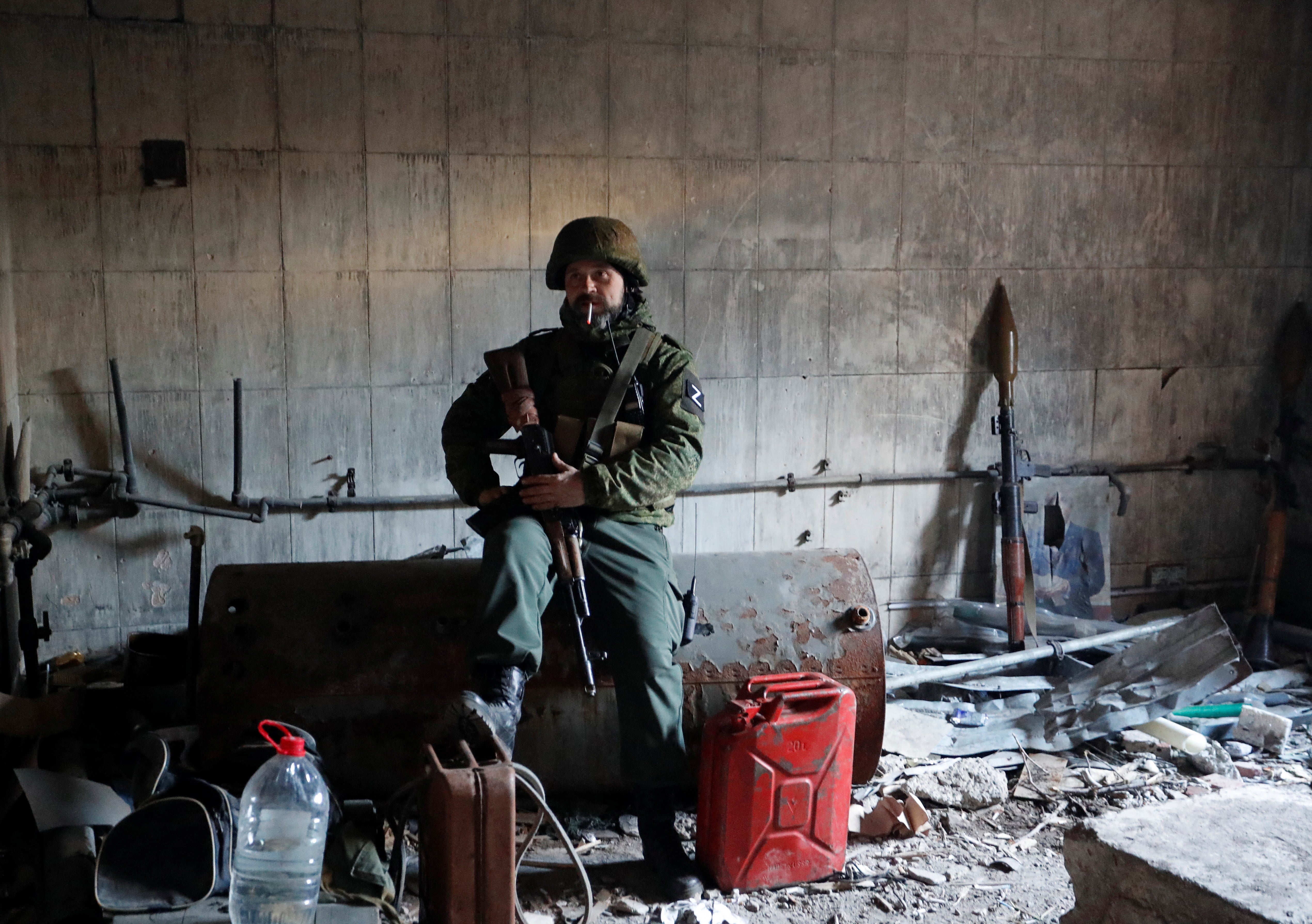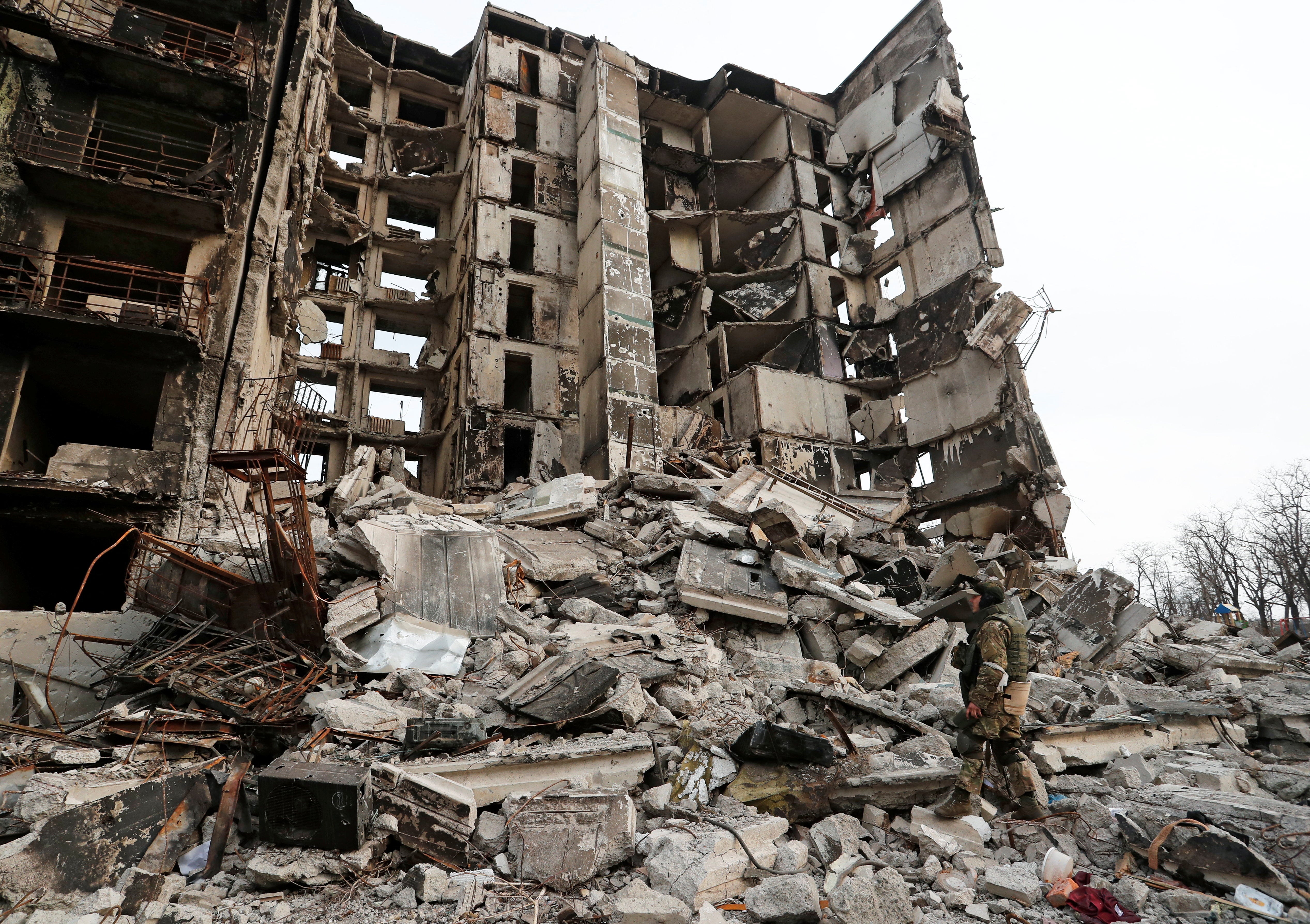Is poor morale among Russia troops undermining Vladimir Putin’s invasion of Ukraine?
All parties engage in information war but some patterns emerging, writes Andrew Buncombe


Your support helps us to tell the story
From reproductive rights to climate change to Big Tech, The Independent is on the ground when the story is developing. Whether it's investigating the financials of Elon Musk's pro-Trump PAC or producing our latest documentary, 'The A Word', which shines a light on the American women fighting for reproductive rights, we know how important it is to parse out the facts from the messaging.
At such a critical moment in US history, we need reporters on the ground. Your donation allows us to keep sending journalists to speak to both sides of the story.
The Independent is trusted by Americans across the entire political spectrum. And unlike many other quality news outlets, we choose not to lock Americans out of our reporting and analysis with paywalls. We believe quality journalism should be available to everyone, paid for by those who can afford it.
Your support makes all the difference.Poor morale among Russia’s troops – particularly the high number of conscripts forced into battle – may be undermining Vladimir Putin’s military efforts in Ukraine, according to observers.
More than a month after Russian forces invaded and starting shelling cities across the country, observers have been struck by Russia’ slow, seemingly poorly-planned advance on Kyiv, and the strong resistance of the Ukrainian army, equipped and trained by Nato forces.
Russia has now said its forces are regrouping, and has claimed its initial objectives have been met.
While Western experts say it is too early, and too difficult, to make comprehensive assessments about every assertion being made about the conflict – Sir Jeremy Fleming, the head of Britain’s GCHQ, did not provide evidence, for instance, to support his claim Russian troops had shot down their own jet – they say it appears clear that poor organisation and poor morale, especially among the large number of conscripts Putin sent into battle, could be an important factor.
The experts warn that during such conflicts, each of the various parties engage in an information war, as they seek to spin the narrative of what is happening.
At the same time, a series of reports from the battlefield, of Russian troops fleeing, of begging for food from villagers, and of telling their Ukrainian captors they did not know where they were, has suggested the troops sent into battle were at the very least, not as prepared as they might have been.
Michael Ryan recently served as the US deputy assistant secretary of defence for Europe, a job that involved engaging with Nato. He believes the Russian troops, which have perhaps lost as many as 10 per cent of its forces during the invasion so far, has reached a “culminating point”, where it is hard for them to gain fresh momentum.
“We have to avoid jumping to conclusions based on what we've seen so far,” he tells The Independent. “[But] a point worth making is that the invasion of Ukraine seemed to be almost as much of a surprise to the Russian army, as it was to the rest of us.”
“I think a lot of their problems are as a result of not being properly prepared for the operations that they were asked to conduct. And that's without consideration of the stiff resistance. You add the stiff resistance to that, and [they’re] utterly unprepared.”
Estimates suggest as many as 20 per cent of Russia’s military consists of conscripts, who are obliged to serve for one year. Initially, Russia said no conscripts were part of Putin’s so-called “special military operation” in Ukraine, an endeavour pitched to the Russian people through state media as an effort to protect Russian-speakers in eastern Ukraine from attacks by “fascists”.
It later acknowledged conscripts had been part of the invasion force, and that a number had been taken prisoner.
“Unfortunately, several facts of the presence of conscripts in the units of the Russian armed forces involved in the conduct of a special military operation on the territory of Ukraine were discovered,” said Igor Konashenkov, a Russian Defence Ministry spokesperson.
Ryan, who served for 25 years in the US Air Force and reached the rank of colonel, says such recruits are most likely to suffer from morale issues, especially groups like those reported to have been traveling with their dress uniforms as they expected to be conducing a victory march in Kyiv in a mater of days.
They have spent weeks or more out in the field, not sleeping or eating well, their cells phones will have been removed for operational reasons, and they then approach cities they have been told will roll over for them, he says.
“And you start seeing stuff blow up, like your friends,” Ryan says. “Ukrainians have been very, very savvy. When you watch the videos of their attacks on Russian columns, the first vehicle they take out is the command and control vehicle. That's where the officer is who's in charge of that particular formation. And they had no senior NCOs.”
Then the Ukrainians target the Russian missiles launchers. The columns are then stuck without officers, and without the protection they expected from their missiles. Videos show tanks being taken out one by one.
“The inexperienced guys are all clustered in the middle,” Ryan continues. “Most of them get out of their tanks and run. Ukrainian farmers have been making tank collections.”

A number of videos have circulated on social media that appear to show Russian soldiers who have been captured. Humanitarian groups have reminded international media that showing interviews with such POWs breaches the Geneva Conventions.
Two weeks ago, CNN was the only international broadcaster present when Ukraine provided a number of POWs to speak.
“I want to tell our commander-in-chief to stop terror acts in Ukraine because when we come back we’ll rise against him,” said one.
Another said: “Putin has given orders to commit crimes. It’s not just to demilitarise Ukraine or defeat the Armed Forces of Ukraine, but now cities of peaceful civilians are being destroyed.”
At the same time, Ukraine has said it investigating unverified reports that its soldiers tortured Russian troops captured in the fighting.
“We take such cases extremely seriously.... There will be an investigation....We do not torture POWs,” Oleksiy Arestovych, an adviser to president Volodymyr Zelenskiy, said in a post on Telegram on March 28.
One of the most most striking pieces of footage apparently showed a group of young soldiers from the Donbass in a military truck, cursing their predicament and denouncing the mission that has taken them to the southern Ukraine city of Sumy, the location of some of the fiercest fighting.
“We're soldiers from Donbass,” says one.
“We’re all ordinary factory workers, kids,” says another “Just kids, 18 years old.”
They say that on YouTube there are videos of “our guys getting captured”.
“They throw us into battle just with machine guns against artillery mortars, and rocket launchers,” says one. “We’re f***ed here.”
Katherine Kjellström Elgin, a Washington-based defence analyst and an expert on Russia’s military, also warns of the need to take the claims of various sides “with a grain of salt”.
Yet, she says some patterns do appear to be emerging, especially in relation to the conscripts sent in to fight.
“The conscripts are less well trained because they’re only expected to serve for one year,” she says. “Most of those individuals are going to have something between four to six months of training, half of which was basic training, you just don't have a lot of knowledge and a lot of experience.”
Elgin, who recently co-authored a recent piece in Politico about conscripts, with Suzanne Freeman, a PhD student candidate at Massachusetts Institute of Technology, says the Russian army has a long tradition of severe bullying, or dedovshchina, dating to the Soviet era, what also impacts morale.
“For quite some time, it was really terrible. We're talking about not insignificant number of suicides, rapes, people getting beaten. Just the worst of hazing that you can imagine,” says Elgin, a fellow at the Center for Strategic and Budgetary Assessments, a think tank that focuses on defence policy.
“After 2008 they tried to address this in part by actually shortening the amount of time that conscripts served. But there are still reports of loss of hazing occurring.”
Elgin also raises the impact on the mental health of the young troops ordered to fire barrages of artillery into residential areas and apartment blocks.
“I imagine that unless you've been psychologically prepared for this, that might hit you pretty hard,” she says.
She says such assessments could be made for all militaries. And unless there is adequate preparation and training, and good leadership, the impact is likely to be greater.
“All of these things can impact the performance of individuals,” she says.
“And that can bubble up to impact the performance of the entire unit, and then potentially the entire army.”
Additional reporting by Katya Bandouil
Join our commenting forum
Join thought-provoking conversations, follow other Independent readers and see their replies
Comments